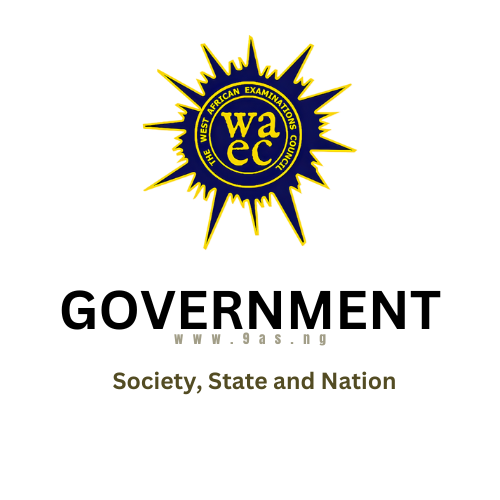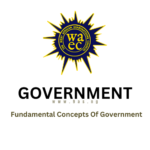THEORY
1. What is a state?
2. What characteristic must a state possess?
3. Describe the term State.
4. What are the features of a State?
5. Define society and identify four features of a society.
6. Differentiate between government and state.
7. Identify four features of a nation.
8. Identify five differences between the state as an entity and government as an institution.
OBJECTIVES
1. The state is different from the government because
A. the State unlike the Government is permanent. B. the Government is made up of powerful people. C. members of the Government are elected. D. The state can exercise absolute power.
2. A state is a special form of human association because it
A. has a legitimate monopoly of life and death penalties over its citizens. B. is the richest association in society. C. has a constitution approved by the citizens. D. can punish law breakers.
3. A citizen expresses loyalty to his nation by
A. participating in sports. B. supporting political parties. C. singing the national anthem when required. D. lobbying for ministerial appointment.
4. An essential feature of a State is
A. availability of mineral resources. B. developed infrastructure. C. an organized system of laws. D. developed markets
5. The primary purpose of the state is to
A. establish a system of law and order. B. train people to become good citizens. C. cater for all the needs of the citizens.. D. ensure the self sufficiency of its people.
6. All the following are experienced by a community without government except
A. insecurity. B. planned development. C. lawlessness. D. political anarchy.
7. Which of the following is not an attribute of a state?
A. Definite territory. B. Population. C. Government. D. Common language.
8. Which of the following is not a feature of a state
A. sovereignty. B. government. C. mass media. D. territory.
9. Which of the following is a feature of a state?
A. Pursuance of sectional interest. B. Colonial experience. C. Territorial boundary. D. Temporary existence.
10. A sovereign state is one
A. whose constitution can only be changed by a military government. B. where its citizens can speak without fear or favour. C. in which sovereignty is invested in the military. D. whose government decisions are made independent of foreign interference.
11. To have an orderly society, a state needs
A president. B. chief judge. C. constitution. D. legislature.
12. Which of the following is not an aim for the existence of a State?
A. Promotion of economic independence. B. Provision of welfare services. C. Maintenance of external relations. D. Promotion of a common lingua franca.
13. A political authority which maintains sovereign power over a specific geographical area is termed the loved
A. nation. B. society. C. state. D. country.
14. A state performs the following functions except
A. promoting the welfare of the citizens. B. encouraging the struggle for power. C. providing social services. D. encouraging trade with other states.
15. Which of the following groups has a compulsory membership?
A. community. B. state. C. society. D. club.
16. A society without constituted authority is called a
A. feudal state. B. stateless society. C. government in exile. D. backward society.
17. The most visible feature of a state is
A. Compulsory membership. B. defined geographical territory. C. written constitution. D. sovereign power.
18. A common language is one of the attributes of a
A. government. B. society. C. nation. D. state.
19. The functions of the state are achieved through
A. political socialization. B. separation of powers. C. organs of government. D. diplomatic means.
20. A unique feature of a state is
A. information. B. anarchy. C. organized laws. D. direct democracy.
21. A sovereign power over a number of people in a specific geographical area is called
A. society. B. region. C. state. D. nation.
22. The basic purpose of setting up a state is to
A. maintain law and order. B. protect foreign interest. C. promote development. D. provide social facilities.
23. By comparism, a state is
A. less permanent than a government. B. more permanent than a government. C. more changeable than a government. D. equally
24. The features of a state include all the following except
A. government. B. territory. C. society. D. population.
25. What is commonly referred to as the association of the government and the governed?
A. Monarchy B. State C. Confederation D. Federation.



